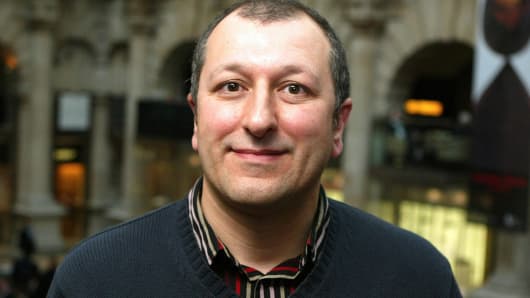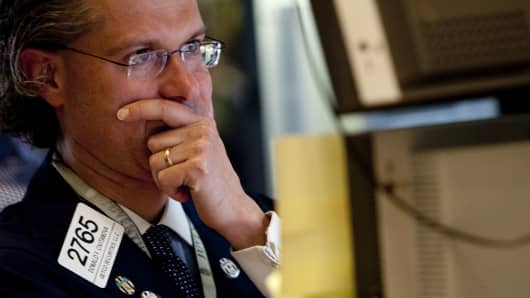CNBC.com
Central banks in the Western world have set the scene for
an "even bigger version" of the 2007-2008 global financial crisis,
Societe Generale's bearish strategist Albert Edwards has claimed.
In a research note on Thursday, Edwards said that China's intervention to stabilize its volatile stock market was part of a larger global story, in which "rock bottom" interest rates and large fiscal deficits in the western world were pushing the global economy towards a fall.
"QE (quantitative easing) will be stepped up to such a pace that you will hear the roar of the printing presses from Mars," Edwards said.
"I have not one scintilla of doubt that the western central banks have set us up for an even bigger version of the 2008 Great Financial Crisis."
In a research note on Thursday, Edwards said that China's intervention to stabilize its volatile stock market was part of a larger global story, in which "rock bottom" interest rates and large fiscal deficits in the western world were pushing the global economy towards a fall.
"QE (quantitative easing) will be stepped up to such a pace that you will hear the roar of the printing presses from Mars," Edwards said.
"I have not one scintilla of doubt that the western central banks have set us up for an even bigger version of the 2008 Great Financial Crisis."
QE has been a mainstay for several major central banks in the wake of the crisis, with money created to buy assets like government bonds, helping to inject liquidity into markets with the aim of stimulating the broader economy.
Given his forecast step up in money-printing, Edwards said that gold, which tends to perform well during periods of high inflation, was a "must-have" safe-haven investment.
Given his forecast step up in money-printing, Edwards said that gold, which tends to perform well during periods of high inflation, was a "must-have" safe-haven investment.
Fed rate hike: Edwards' foil?
While Edwards forecast prolonged ultra-easy monetary policy, many investors expect an interest rate hike by the U.S. Federal Reserve as early as this fall.
"I think September is very much on play. I mean, look at where we are," Manish Singh, head of investments at Crossbridge Capital, told CNBC on Thursday. He pointed to improving U.S. GDP growth rates and unemployment, which declined to 5.3 percent in June.
Read MoreThe Federal Reserve: CNBC Explains
The Fed indicated on Wednesday that it was waiting for "some further improvement in the labor market," and inflation to move upwards towards its 2 percent target before raising interest rates.
"I think September is very much on play. I mean, look at where we are," Manish Singh, head of investments at Crossbridge Capital, told CNBC on Thursday. He pointed to improving U.S. GDP growth rates and unemployment, which declined to 5.3 percent in June.
Read MoreThe Federal Reserve: CNBC Explains
The Fed indicated on Wednesday that it was waiting for "some further improvement in the labor market," and inflation to move upwards towards its 2 percent target before raising interest rates.
Across the Atlantic, there has been speculation that a
more hawkish cohort of Bank of England policymakers could soon lead to
higher interest rates in Britain.
Some economists predict that at this month's meeting, two members of the bank's Monetary Policy Committee voted in favor of rating the interest rate, rather than maintaining it at record low rate of 0.5 percent. The minutes from the meeting will be revealed next Thursday, giving a picture of how "hawkish" the hawks are.
Read MoreWhy hawks are circling again at the Bank of England
While Edward's bearish thoughts and predictions are widely-read by his fellow bankers and strategists, they do not always come true.
In September 2012, for instance, he announced that the U.S. was in recession and that Wall Street would soon react, and warned of an "ultimate" death cross for the S&P 500—where the 50-month moving average falls below the 200-month moving average. Instead the S&P 500 continued to rally, and has gained nearly 50 percent since Edwards' pronouncement.
Some economists predict that at this month's meeting, two members of the bank's Monetary Policy Committee voted in favor of rating the interest rate, rather than maintaining it at record low rate of 0.5 percent. The minutes from the meeting will be revealed next Thursday, giving a picture of how "hawkish" the hawks are.
Read MoreWhy hawks are circling again at the Bank of England
While Edward's bearish thoughts and predictions are widely-read by his fellow bankers and strategists, they do not always come true.
In September 2012, for instance, he announced that the U.S. was in recession and that Wall Street would soon react, and warned of an "ultimate" death cross for the S&P 500—where the 50-month moving average falls below the 200-month moving average. Instead the S&P 500 continued to rally, and has gained nearly 50 percent since Edwards' pronouncement.
Chinese intervention
Edwards' speculation on Chinese intervention comes in the
wake of market volatility across Asian markets. China's central bank
earlier this week said various monetary tools would be used to ensure
market liquidity through to year-end, according to Reuters, following a
dramatic plunge in Chinese equities, with the Shanghai Composite closing down 8.5 percent on Monday.
Read MoreWhat's fueling the frenzy in China stocks?
The Chinese Securities Regulator has also said it will increase its stock purchases in an effort to prop up the market.
The moves come as part of a tradition of intervention by the Chinese government, whose efforts to prevent to tackle market volatility included a ban earlier this month on shareholders selling large stakes in listed firms.
—With reporting from CNBC's Matt Clinch.
Read MoreWhat's fueling the frenzy in China stocks?
The Chinese Securities Regulator has also said it will increase its stock purchases in an effort to prop up the market.
The moves come as part of a tradition of intervention by the Chinese government, whose efforts to prevent to tackle market volatility included a ban earlier this month on shareholders selling large stakes in listed firms.
—With reporting from CNBC's Matt Clinch.


No comments:
Post a Comment